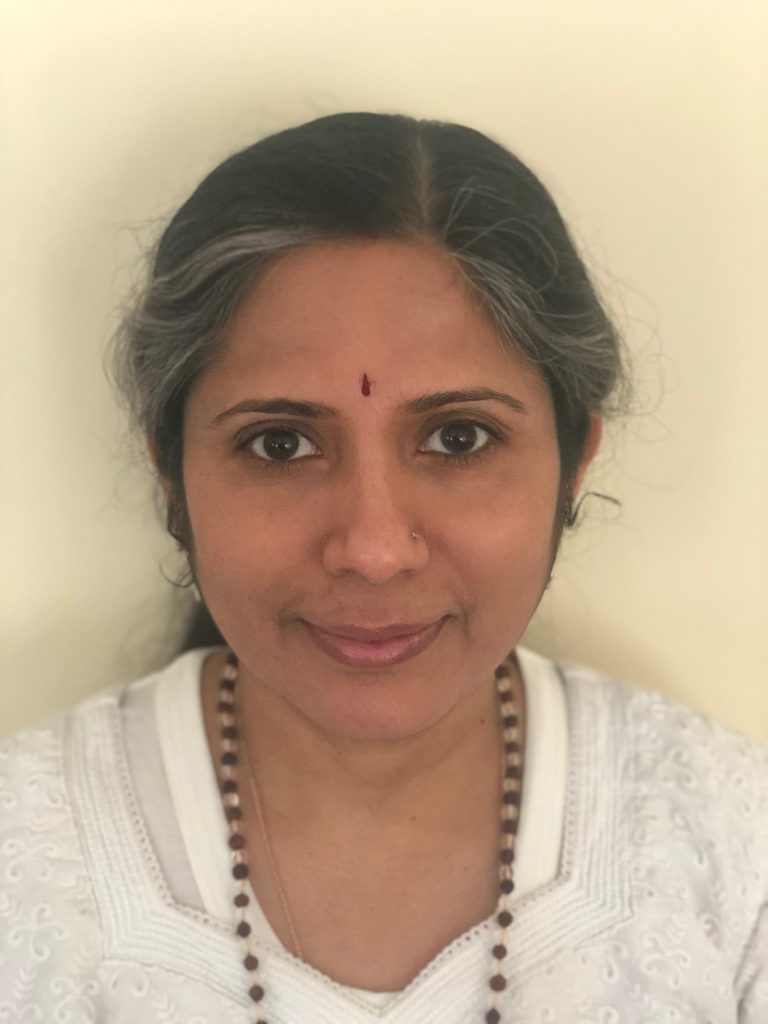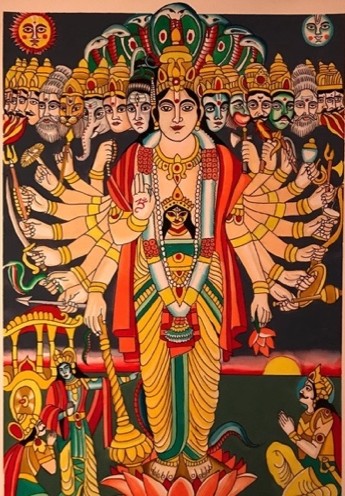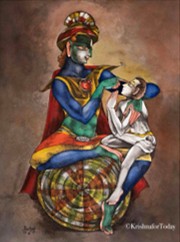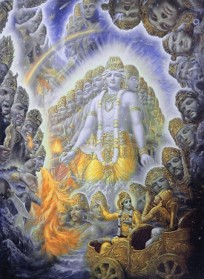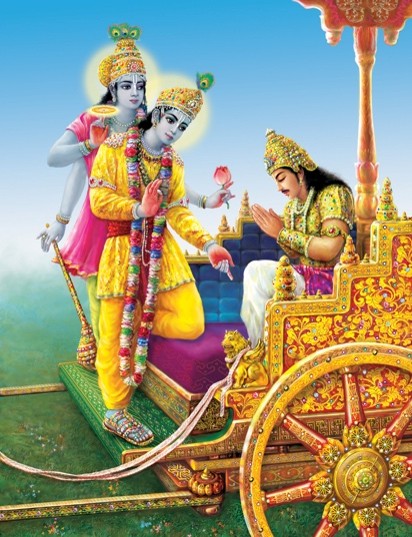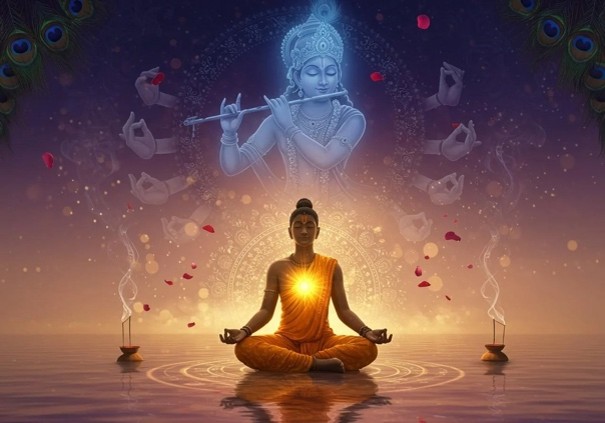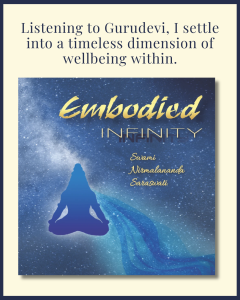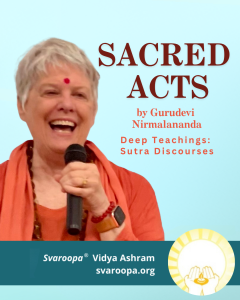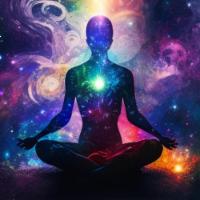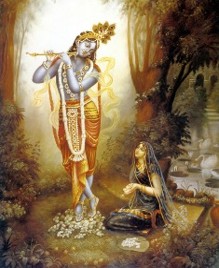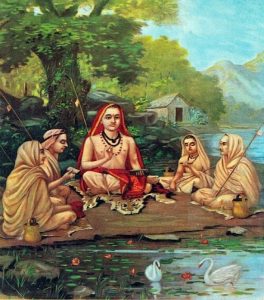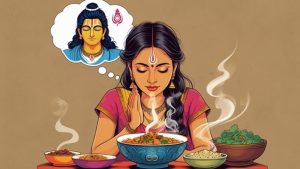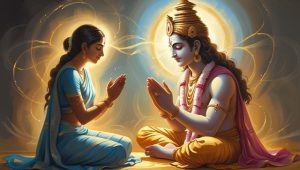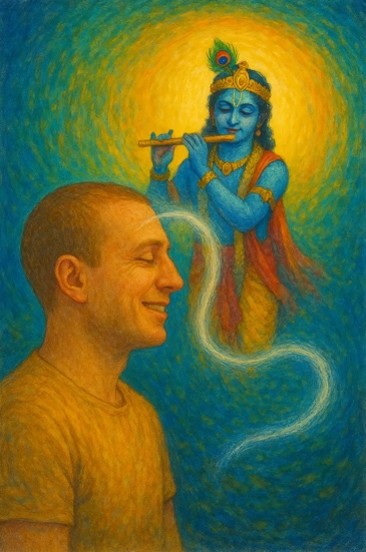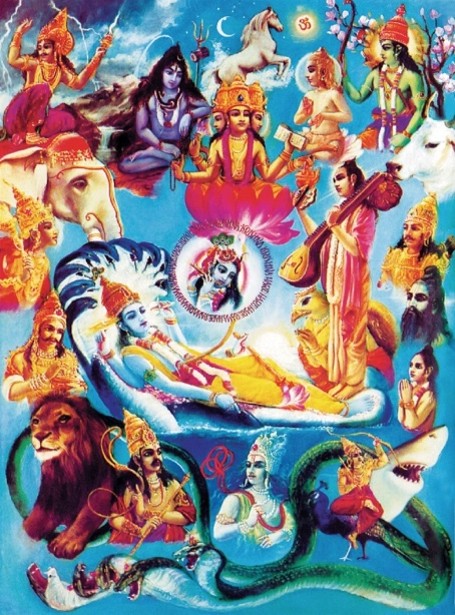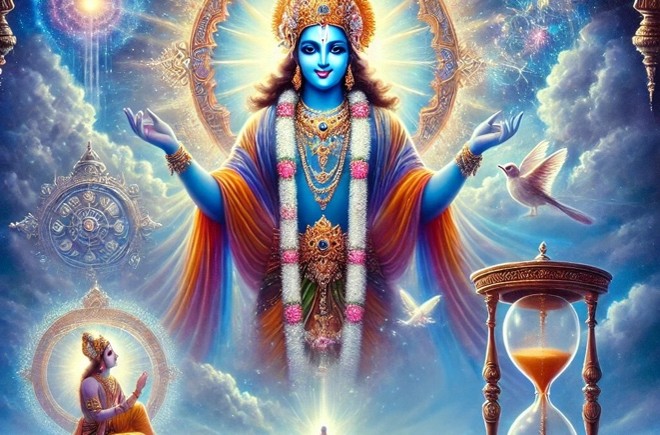By Nirooshitha Sethuram, Yogaratna
Graphics by Sheralee (Shambhavi) Hancherow
Chapter 11: Vishwarupa Sandarshana Yoga (The Yoga of the Vision of the Divine Form)
Krishna grants Arjuna the divine privilege of witnessing His Vishwarupa (cosmic form). This unparalleled revelation, a manifestation of infinite splendor, encompasses all creation — past, present, and future — within Krishna’s being.
Arjuna beholds countless faces, arms and ornaments gleaming with divine radiance, a sight both mesmerizing and overwhelming. Through this form, Krishna demonstrates His omnipotence and serves as a reminder of the Ultimate Truth: One Divine Essence pervades the universe.
As Arjuna gazes upon the cosmic form, awe and fear grip his heart. He sees all the worlds converging into Krishna’s fiery maw, a vision of creation and destruction intertwined. The sight underscores the impermanence of life and the inevitability of cosmic cycles.
Arjuna, humbled and shaken by the magnificence and ferocity of the divine form, bows in reverence, realizing that Krishna is the origin and end of all existence.
This chapter also emphasizes the necessity of Divine Grace to perceive transcendental reality. Krishna grants Arjuna “divine eyes” to fully comprehend His cosmic form. It highlights the limitations of mortal perception and the profound spiritual awakening that accompanies divine intervention.
Through this spectacle, Arjuna understands that surrender and devotion are the pathways to recognizing and embracing the divine.
Finally, Krishna reassures Arjuna, urging him to cast aside fear and confusion. He reminds Arjuna of his dharma, the righteous duty of a warrior, and affirms that the Divine will guide all his actions.
This chapter concludes by underscoring the importance of unwavering devotion and surrender to the divine, laying the foundation for more teachings to come.
The Dialog
Arjuna says, “Out of compassion towards me, You have cleared my delusion by Your explanation of the highest secret concerning the Self. I have learnt from You at length of Your inexhaustible greatness.
“As You have described Yourself, I wish to see Your Divine Form. If You think it is possible for me to see It, then, show me Your Imperishable Universal Self.”
Krishna says, “Behold now My opulence, multicolored by the hundreds and the thousands, manifold and divine. Witness the Adityas, the Vasus and the Rudras (different forms of God), many wonders that no one has ever seen before.
“Behold here today, the whole universe, of the moving and the unmoving, and whatever else you desire to see, all concentrated in My body.
“But with these eyes of yours you cannot see Me. I give you divine eyes; behold, now, My sovereign yoga-power.”
Sanjaya says to Dhritarashtra, “Having said that, Krishna, the Lord of Yoga, showed to Arjuna, His Supreme Form as the Lord of the Universe.
“With many faces and eyes, presenting many wondrous sights, bedecked with many celestial ornaments, armed with many divine uplifted weapons, wearing celestial garlands and vestments, anointed with divine perfumes, all — wonderful, resplendent, boundless, and with faces on all sides. If the splendor of a thousand Suns was to blaze all at once in the sky, that would be like that of the Mighty Being.
“There, in the body of the God of gods, Arjuna then saw the whole universe resting in the one, with its many groups. Then, Arjuna bowed down his head to the Lord and spoke with joined palms.”
Arjuna says, “I behold all the gods, in Your body, and various classes of beings; Brahma, the Lord of creation, seated on the lotus, all the sages and the celestial serpents. I see You of boundless form on every side.
“Neither the end nor the middle nor the beginning of the universe I see in Your cosmic form. I see You as a mass of radiance shining everywhere immeasurably, very hard to look at.
“The space between earth and the heavens and all the quarters filled by You alone. I have seen Your wonderful and terrible form. From the Rudras to the demons, and others are all looking at You in great astonishment.
“When I look upon Your blazing form reaching to the skies and shining in many colors, with the mouths opened wide and great eyes glowing bright, my inmost soul trembles in fear. I am terrified at heart and find neither courage nor peace.
“I see everyone hurriedly rush into Your mouths for destruction, as moths hurriedly rush into a blazing flame. Who are You, wearing this terrifying form? I bow to You, Supreme God! Please show mercy.
“I wish to understand who You are, the Origin of everything, as I cannot grasp Your purpose.”
Krishna says, “I am time, destroyer of the worlds, here to slay these men. Even without you, all these warriors in the opposing armies shall not live.
“Therefore, stand up and obtain fame. Conquer the enemies and enjoy the incomparable kingdom. Verily, they have already been slain by Me. You are just an instrument. Kill Drona, Bhishma, Jayadratha, Karna, and the other great warriors as well, they already have been killed by Me. Don’t be distressed by fear. Fight! “
Sanjaya says to Dhritarashtra, “Having heard these words of Krishna, Arjuna trembled, folded his hands in adoration, and bowed down. Overwhelmed with fear, he saluted Krishna and then addressed Him again, in a choked voice.”
Arjuna says, “Krishna, the world rejoices in Your glory, while demons flee and the wise bow before You. You are the Infinite, the Creator, the Supreme Refuge, and the Knower of all. You are the primal God, the supreme refuge of this universe, the knower, the knowable and the supreme abode.
“Forgive my moments of familiarity or disrespect, and bear with me as a father, a friend, or beloved would. Though Your Universal Form fills me with awe and fear, I long to see You again in Your gentle two-armed form. Please grant me this mercy.”
Krishna says, “This Universal Form has been shown to you by My own yogic power, which has never been seen by any other than you, Arjuna. Be not afraid, behold again My other form.”
Sanjaya says to Dhritarashtra, “Having said that, Krishna revealed His own form, a graceful shape again and comforted the terrified Arjuna.”
Arjuna says, “Seeing this humanlike form, my mind is now pacified, I am myself again.”
Krishna says, “It is hard to see the form you saw. Even the Gods are eager to see it. That form cannot be understood simply by studying the Vedas, nor by undergoing serious penances, nor by charity, nor by worship. Only by devotion to Me may I be understood in this form”
Chapter 12: Bhakti Yoga (The Yoga of Devotion)
This Chapter delves into the path of devotion as the means to attain spiritual enlightenment and unity with the Supreme One. Here, Arjuna asks Krishna about the distinction between those who worship the unmanifested, formless aspect of the divine versus those who worship the personal form with devotion.
Krishna explains that while both paths can lead to liberation, the path of devotion is easier and more accessible for most seekers.
He emphasizes that true devotion transcends rituals and external practices. It is the purity of the heart, a deep connection to the divine and unwavering trust that elevate a devotee.
Worshipping the Formless Absolute requires intense discipline, self-control, and detachment, which are challenging for many. In contrast, surrendering to God through love, humility and unwavering faith brings quicker results and inner peace.
Krishna outlines the qualities of an ideal devotee: free from malice and hatred, humble and forgiving, content and self-controlled, unshaken by joy or sorrow, compassionate and detached from material desires.
Chapter 12 underscores the importance of cultivating a personal relationship with God through love, faith, and selflessness. It emphasizes that bhakti, or devotion, is not only a spiritual discipline but also a way of life, leading to liberation and unity with the divine.
The Dialog
Arjuna asks, “There are devotees who worship You, and there are those who meditate on the unmanifest Imperishable Brahman. Of the two types of seekers, who are superior knowers?”
Krishna says, “Those who, having restrained well all the senses, even minded, rejoicing in the welfare of all beings, meditate on the indefinable, eternal, all-pervading, and Imperishable Brahman, they attain Me.
“Those who worship Me, ever steadfast in their devotion, endowed with the highest faith, with their mind established in Me, they attain Me too. But they are in my opinion, the best of yogis.
“Greater is the trouble for whose minds are set on the Unmanifest. The goal of the Unmanifest, is very hard for the embodied to reach. But to those who worship Me, renouncing all actions in Me, regarding Me as the supreme goal, meditating on Me with single-minded focus, I become, ere long, their Savior, quickly lifting them up from the ocean of birth and death.
“Fix your mind firmly in Me, place your intellect in Me, thereafter you shall live in Me. If you are not able to fix your mind firmly in Me, then desire to reach Me by constant practice of devotion. If you are unable even to practice constant devotion, be intent on performing actions for My sake. Even by doing actions for My sake, you shall attain perfection.
“If you are unable to do even this, then take refuge in Me, renouncing the fruits of all actions by self-control. Better than knowledge is practice. Better than knowledge is meditation. Better than meditation is the renunciation of the fruits of actions, for peace immediately follows renunciation.”
“He is dear to Me who hates no creature, who is friendly and compassionate to all, who is free from attachment and egoism, balanced in pleasure and pain, and forgiving, ever content, steady in meditation, self-controlled, possessed of firm conviction, with mind and intellect dedicated to Me.
“They are dear to Me who do not cause agitation and is not agitated by the world, and who is freed from joy, envy, fear and anxiety.
“He is dear to Me who is free from wants, pure, skillful, unconcerned and untroubled, renouncing all undertakings or commencements, thus devoted to Me. He is dear to Me who neither rejoices, nor hates, nor grieves, nor desires, renouncing good and evil.
“He is dear to Me who does not rejoice when he attains desirable objects nor does he grieve when he parts with his cherished objects and who does not desire the unattained. He who is equal minded towards friends and enemies, in honor and disgrace, in heat and cold, and pleasure and pain, who is free from attachment.
“He who is silent, meditating, who is satisfied with whatever he gets, who has no particular home, who is decided in mind, who is devoted to Me. Indeed, devotees who follow this great wisdom as described above, endowed with faith, regarding Me as their Supreme Goal, such are exceedingly dear to Me.”
More to come…
- Krishna’s Vishwarupa https://www.instagram.com/p/BlpFs3tlUk0/?utm_source=ig_share_sheet&igshid=e7q9b4kloxwd&epik=dj0yJnU9TUE2Qm1oc0lLZXY1TWQ4VkNaQWtwUjBSeFBuazRDT0YmcD0wJm49b1ZQLVdBczNFbExaQTRHeUdWZ3ZRUSZ0PUFBQUFBR2llWGFZ
- Surrender & devotion https://gailbrenner.com/2022/10/devotion-surrender/
- Krishna giving Arjuna “Divine Eyes” https://bhagavadgita.org.in/Blogs/61a0fc5a5369ed0f148e5ad5
- Arjuna witnessing Krishna’s Vishwarupa. https://www.pinterest.com/pin/329185053989236502/
- Krishna reveals his two-armed form to Arjuna. https://asitis.com/gallery/plate32
- Bhakti Yoga – Purity of heart, connection to Divine. https://www.poojn.in/post/31248/bhakti-yoga-quotes-reflections-a-path-to-devotion?srsltid=AfmBOookcbAgIpxTaO2jTH3VoDoLhVSUjFps13_k6MNIww_UEkxIQG3y
- Bhakti Yoga- cultivating devotion to Krishna. https://www.radhakrishnatemple.net/blog/bhagavad-gita-for-beginners/
- Not agitated by the world. https://www.jkyog.org/blog/bhagavad-gita-wisdom-krishna-path-to-detachment-and-inner-peace/
